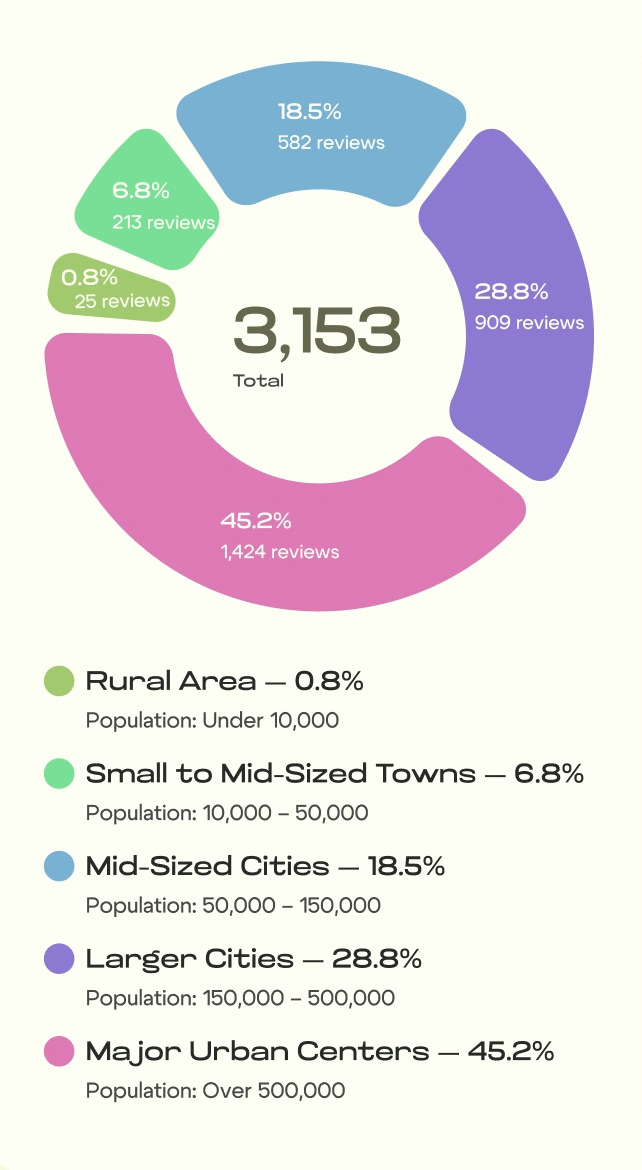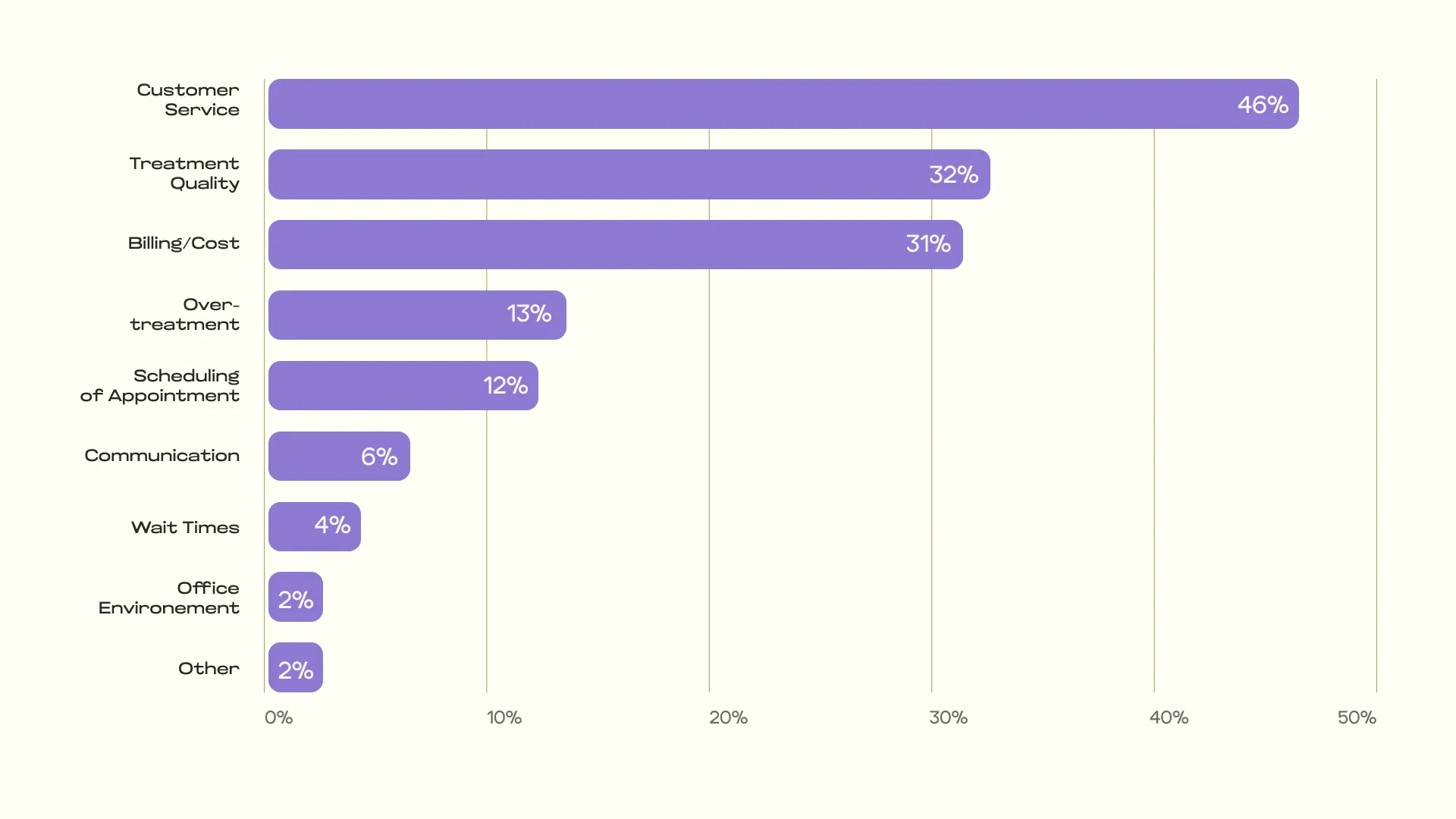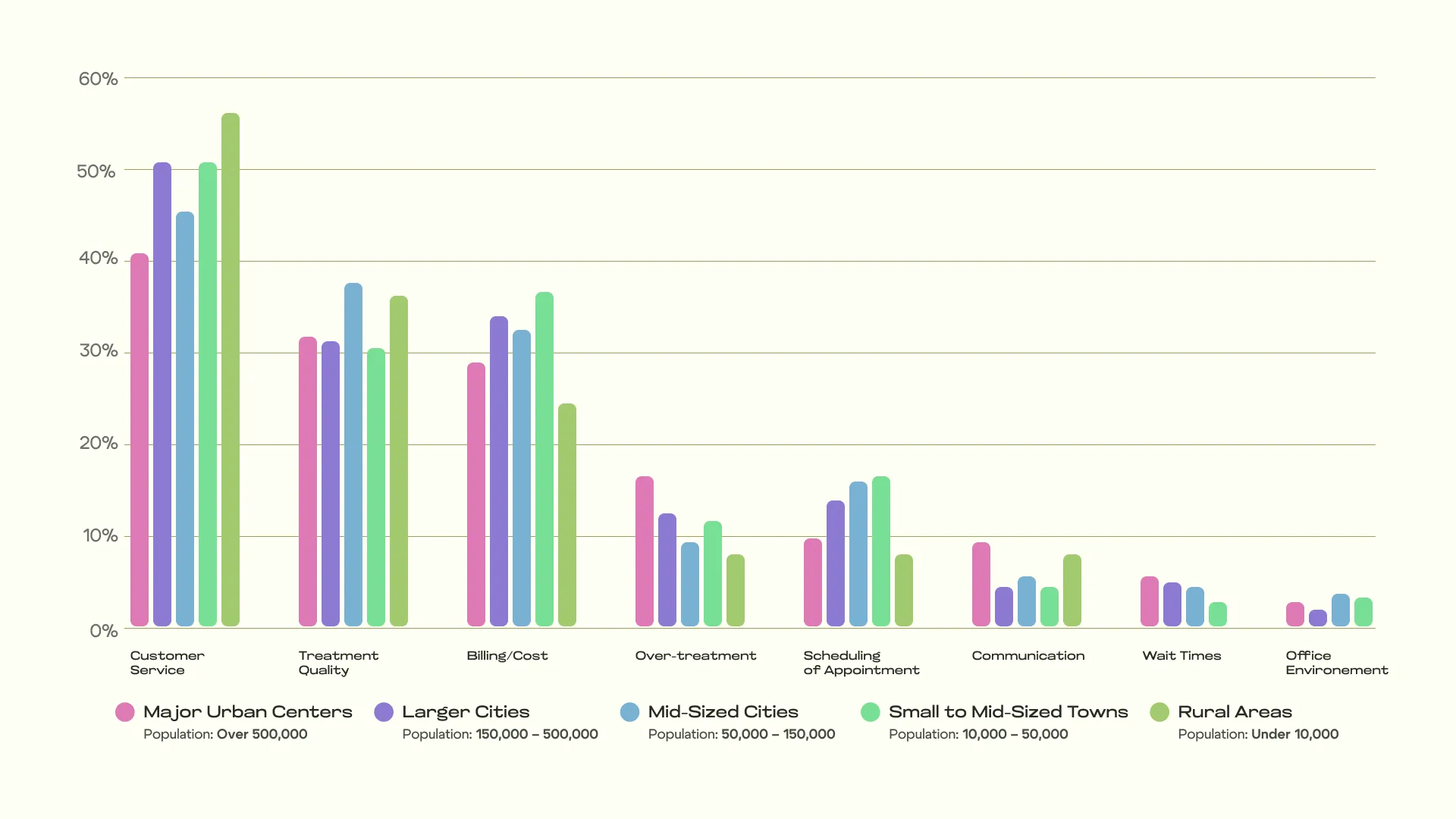
Is treatment what patients of a dental clinic care about most?
At first glance, the answer might seem obvious. Surely, the quality of dental work must be the deciding factor in whether patients are satisfied. Yet, after analyzing 3,153 negative reviews from 289 dental clinics across Ontario, we found a different story.
While treatment quality remains important, it is not the main driver of dissatisfaction. Instead, patients often focus on how they were treated as people: the warmth of the staff, the clarity of communication, the ease of booking, and even the atmosphere of the clinic.
This research reveals a reality every clinic should consider: patient experience extends far beyond the dental chair.
How We Conducted the Study
We gathered and analyzed Google reviews rated between 1–3 stars from Ontario dental clinics that met two criteria:
- At least 100 reviews.
- Focus on general dentistry.

Only reviews containing written explanations were included, and irrelevant or mistaken entries were filtered out.
Each review was then classified into one or more categories:
- Customer Service (staff attitude, empathy, inclusivity)
- Treatment Quality (outcomes, accuracy, follow-up)
- Billing/Cost (hidden fees, insurance issues)
- Over-treatment (perceived unnecessary procedures)
- Scheduling/Appointments (ease of booking, reminders, flexibility)
- Wait Times (delays without explanation)
- Communication (clarity of explanation and care instructions, follow-up care)
- Office Environment (cleanliness, accessibility, comfort)
- Other (miscellaneous or rare complaints)
Finally, we compared results across community types (rural areas to major urban centers) and clinic sizes (small, medium, large).
What Patients Really Complain About
Across Ontario, the most frequently cited issue was Customer Service, accounting for roughly 45% of all complaints. These reviews often mentioned dismissive front-desk staff, rushed dentists, lack of empathy, or even discriminatory behavior.
By comparison, Treatment Quality appeared in only about 30–37% of complaints. Still significant, but overshadowed by the human and organizational aspects of care.
Other recurring themes included:
- Billing and unexpected costs: hidden fees, unclear insurance coverage, or rigid payment policies.
- Over-treatment and upselling: patients wary of being charged for unnecessary procedures.
- Scheduling frustrations: emergencies rescheduled, excessive reminders, or appointments mishandled.
- Wait times: long delays without explanation, particularly in larger cities.
- Communication gaps: unclear treatment plans, poor pre- or post-care instructions, lack of follow-up.
Even seemingly minor details like receiving no toothbrush kit after a cleaning, or staff speaking another language during a procedure were enough to trigger frustration and bad reviews.
Community Matters: Different Places, Different Priorities
Patient expectations shifted depending on the type of community:
The diagram shows the percentage of reviews mentioning specific issue categories, categorized by the type of area where the clinic is located.
Reviews highlighting multiple concerns were classified into more than one category.
- Rural areas (under 10,000 people): Patients valued personal service and relationships. Complaints here leaned heavily toward Customer Service (42–56%).
- Small towns (10,000–50,000): Higher emphasis on Treatment Quality (45%), reflecting fewer alternatives for dental care.
- Mid-sized cities (50,000–150,000): Focus shifted toward convenience and accessibility, with complaints about wait times and modernity.
- Large cities (150,000–500,000): Patients emphasized professionalism and efficiency, with Billing/Cost concerns also prominent.
- Major urban centers (500,000+): Complaints were more diverse ranging from over-treatment and aggressive upselling to wait times and poor communication.
In short: where patients live influences what they expect and what frustrates them most.
Does Clinic Size Make a Difference?
Interestingly, clinic size did not dramatically change the distribution of issues. Whether a patient visited a small practice or a large network, Customer Service hovered around 45 — 46% of complaints.
The only subtle trends:
- Smaller clinics saw slightly more complaints about Treatment Quality.
- Medium-sized clinics had more mentions of Over-treatment.
- Large clinics drew more criticism for Scheduling and Appointment handling.
Stories Behind the Numbers
Numbers tell us what’s common, but patient words show us what it feels like:

Great hygienist service overshadowed by disrespectful front desk staff.

I was told I had 10 cavities, another dentist confirmed only 2.

They rushed my appointment because another patient was waiting.

Receptionist said: "We don’t take that insurance, that’s only for poor people."

I cancelled a procedure and had to wait months for my refund.
These reviews reveal the emotional weight of poor service. Patients may forgive a slightly painful cleaning, but they are less likely to forget being disrespected, overcharged, or ignored.
What This Means for Dental Clinics
The study’s findings point to a clear conclusion: great dentistry is necessary, but not sufficient.
Patients expect competent treatment, but what truly drives loyalty is how they are cared for before, during, and after the procedure.
Negative reviews often arise not from clinical errors but from breakdowns in the patient journey: unclear communication, poor scheduling, long waits, or a lack of empathy. To prevent these pain points, clinics need to see care as an experience that begins before and continues after the appointment. Understanding patients and mapping their journeys allows teams to identify friction, resolve it, and design moments that feel seamless and respectful. By focusing on empathy, clarity, and convenience at every touchpoint, dental clinics can transform visits from stressful obligations into positive, lasting experiences.
For clinics seeking to grow and thrive, the message is simple: invest in overall patient experience, not just procedures.

Why Patients Leave Negative Reviews

Why Patients Leave
Negative Reviews
Request a free report based on the study of 3,153 negative reviews.



